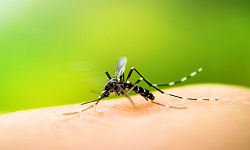Parasite
A parasite is an organism that lives within or on a host. The host is another organism. The parasite uses the host’s resources to fuel its life cycle. It uses the host’s resources to maintain itself. Parasites vary widely. Around 70 percent are not visible to the human eye, such as the malarial parasite, but some worm parasites can reach over 30 meters in length.
Parasites are not a disease, but they can spread diseases. Different parasites have different effects.
Endoparasite
These live inside the host. They include heartworm, tapeworm, and flatworms. An intercellular parasite lives in the spaces within the host’s body, within the host’s cells. They include bacteria and viruses.
Endoparasites rely on a third organism, known as the vector, or carrier. The vector transmits the endoparasite to the host. The mosquito is a vector for many parasites, including the protozoan known as Plasmodium, which causes malaria.
Epiparasite
These feed on other parasites in a relationship known as hyper parasitism. A flea lives on a dog, but the flea may have a protozoan in its digestive tract. The protozoan is the hyperparasite.
- Protozoa
- Helminths
- Ectoparasites
Related Conference of Parasite
13th International Conference on Infectious Diseases, Bacteriology and Antibiotics
6th World Congress on Tuberculosis, Lung Infections, and Respiratory Care
10th International Conference on Infectious Diseases: Control and Prevention
14th World Congress on Control and Prevention of HIV/AIDS, STDs & STIs
Parasite Conference Speakers
Recommended Sessions
- Antibiotics
- Bacterial Infections
- Dermatological Infections
- Fungal Infections
- Infection Prevention and Control
- Infectious Disease
- Molecular Diagnosis of Infectious Diseases
- Neurological Infections
- Obstetrics and Gynaecology
- Ophthalmological Infections
- Paediatric Infectious Diseases
- Parasite
- Pharmacology and Therapeutics
- Prions
- Public Health
- Tropical Disease
- Urinary Tract Infection
- Vaccines
- Viral Infections
Related Journals
Are you interested in
- Advances in Pulmonary Care and Rehabilitation - Tuberculosis 2026 (France)
- Advances in Tuberculosis Diagnosis - Tuberculosis 2026 (France)
- Alcohol and Drug Use - STD-HIV AIDS-2026 (Spain)
- Antimicrobial Resistance (AMR) - Infection Congress 2026 (UK)
- Antimicrobial Stewardship in Respiratory Care - Tuberculosis 2026 (France)
- Antimicrobial Stewardship/Antimicrobial Resistance - Infection Prevention 2026 (Spain)
- Bacterial Infections and Antimicrobial Resistance (AMR) - Euro Infectious Diseases 2026 (UK)
- Bacterial Infectious Diseases - INFECTIOUS DISEASES-2026 (France)
- Bacterial, Parasitic and Fungal Infections - Infection Prevention 2026 (Spain)
- Biomarkers for Rare Disease Diagnosis and Treatment - Rare Diseases Congress 2026 (Czech Republic)
- Biomedical Research - Rare Diseases Congress 2026 (Czech Republic)
- Blood Borne Infections/Sepsis/Septicaemia - Infection Prevention 2026 (Spain)
- Causes and Symptoms of Infections - Infection Prevention 2026 (Spain)
- Causes and Symptoms of Infectious Diseases - INFECTIOUS DISEASES-2026 (France)
- Challenges of Living with a Rare Disease: - Rare Diseases Congress 2026 (Czech Republic)
- Climate Change and Infectious Diseases - Infection Congress 2026 (UK)
- Climate Change, Urbanization, and Infectious Disease Spread - Euro Infectious Diseases 2026 (UK)
- Clinical and Case Reports - INFECTIOUS DISEASES-2026 (France)
- Clinical Case Reports and Case Studies - Rare Diseases Congress 2026 (Czech Republic)
- Clinical Management of Infectious Diseases - INFECTIOUS DISEASES-2026 (France)
- Clinical Research and Case Reports - STD-HIV AIDS-2026 (Spain)
- Clinical Research on Orphan Drugs - Rare Diseases Congress 2026 (Czech Republic)
- Co-infections Associated with STD - STD-HIV AIDS-2026 (Spain)
- Coronavirus Disease (COVID-19) - INFECTIOUS DISEASES-2026 (France)
- COVID-19 Variants - Infection Congress 2026 (UK)
- Covid_19 Infections - Infection Prevention 2026 (Spain)
- Diagnosis and Treatment - STD-HIV AIDS-2026 (Spain)
- Diagnosis f infectious Diseases - Infection Prevention 2026 (Spain)
- Diagnostics and Molecular Tools in Infectious Disease - Euro Infectious Diseases 2026 (UK)
- Different Types of Rare Diseases: - Rare Diseases Congress 2026 (Czech Republic)
- Disinfection and Sterilization - Infection Control 2026 (UK)
- Drug Discovery for Rare Diseases: - Rare Diseases Congress 2026 (Czech Republic)
- Drug-Resistant Tuberculosis and Treatment Strategies - Tuberculosis 2026 (France)
- Emerging and Re-Emerging Infections - Infection Prevention 2026 (Spain)
- Emerging and Zoonotic Respiratory Infections - Tuberculosis 2026 (France)
- Emerging Infectious Diseases - Infection Control 2026 (UK)
- Emerging Infectious Diseases - Infection Congress 2026 (UK)
- Emerging Technologies in Rare Disease Research - Rare Diseases Congress 2026 (Czech Republic)
- Environmental and Occupational Lung Diseases - Tuberculosis 2026 (France)
- Epidemiology - INFECTIOUS DISEASES-2026 (France)
- Epidemiology - Infection Prevention 2026 (Spain)
- Epidemiology and Public Health - Infection Congress 2026 (UK)
- Fungal Infections: Diagnosis and Emerging Threats - Euro Infectious Diseases 2026 (UK)
- Fungal Infectious Diseases - INFECTIOUS DISEASES-2026 (France)
- Future Directions in Respiratory Medicine - Tuberculosis 2026 (France)
- Gastrointestinal and Urinary Tract Infections - Infection Prevention 2026 (Spain)
- Global Health and Policy Approaches to TB and Respiratory Care - Tuberculosis 2026 (France)
- Global Health Security - Infection Congress 2026 (UK)
- Global Trends in Emerging Infections - Infection Prevention 2026 (Spain)
- Health Economics and Market Access for Orphan Drugs - Rare Diseases Congress 2026 (Czech Republic)
- Hepatitis Prevention - Infection Control 2026 (UK)
- Hepatitis Prevention - Infection Prevention 2026 (Spain)
- HIV and Women's Health Issues - STD-HIV AIDS-2026 (Spain)
- HIV Prevention, Treatment and Cure - Infection Control 2026 (UK)
- HIV/AIDS and Sexually Transmitted Infections (STIs) - Euro Infectious Diseases 2026 (UK)
- Hospital-Acquired Infections (Nosocomial Infections) - Infection Congress 2026 (UK)
- Immunizations and Vaccination - Infection Prevention 2026 (Spain)
- Immunology of Tuberculosis and Respiratory Infections - Tuberculosis 2026 (France)
- Infection Control and Hospital-Acquired Infections (HAIs) - Euro Infectious Diseases 2026 (UK)
- Infection Control and Hospital-Acquired Respiratory Diseases - Tuberculosis 2026 (France)
- Infection Control Bacteriology - Infection Control 2026 (UK)
- Infection Control Business - Infection Control 2026 (UK)
- Infection Control in Critical Care - Infection Prevention 2026 (Spain)
- Infection Control in Dental - Infection Control 2026 (UK)
- Infection Control in Dental - Infection Control 2026 (UK)
- Infection Control Precautions - Infection Control 2026 (UK)
- Infection Control Procedures - Infection Prevention 2026 (Spain)
- Infection Control Treatment & Diagnosis - Infection Control 2026 (UK)
- Infection Prevention and Control - Infection Prevention 2026 (Spain)
- Infection Prevention and Control (IPC) - Infection Congress 2026 (UK)
- Infection Treatment and Control - Infection Control 2026 (UK)
- Infection, Immunity and Inflammation - INFECTIOUS DISEASES-2026 (France)
- Infectious Disease Pathology - Infection Control 2026 (UK)
- Infectious Diseases - INFECTIOUS DISEASES-2026 (France)
- Infectious Diseases and Immune Deficiencies - Rare Diseases Congress 2026 (Czech Republic)
- Infectious Diseases Epidemiology - INFECTIOUS DISEASES-2026 (France)
- Infectious Diseases Prevention, Control and Cure - INFECTIOUS DISEASES-2026 (France)
- Influenza and Diagnostic Approaches - Infection Control 2026 (UK)
- Innovative Drug Delivery Systems for Respiratory Therapy - Tuberculosis 2026 (France)
- Internal Medicine for Infectious Diseases - INFECTIOUS DISEASES-2026 (France)
- Introduction and Causes of New Rare Diseases: - Rare Diseases Congress 2026 (Czech Republic)
- Neuro Infections - Infection Prevention 2026 (Spain)
- Neuro Infectious Diseases - INFECTIOUS DISEASES-2026 (France)
- Nosocomial Infections & Control - INFECTIOUS DISEASES-2026 (France)
- Nosocomial Infections & Control - Infection Control 2026 (UK)
- Nosocomial Infections and Control - Infection Prevention 2026 (Spain)
- Nursing Infection Control - Infection Control 2026 (UK)
- Nutrition and Lifestyle Interventions in Respiratory Health - Tuberculosis 2026 (France)
- One Health and Emerging Global Threats - Euro Infectious Diseases 2026 (UK)
- One Health Approach - Infection Congress 2026 (UK)
- Ophthalmological Infections - Infection Prevention 2026 (Spain)
- Orphan Drugs Potentiality - Rare Diseases Congress 2026 (Czech Republic)
- Pandemic Preparedness - Infection Congress 2026 (UK)
- Parasitic Infections and Neglected Tropical Diseases (NTDs) - Euro Infectious Diseases 2026 (UK)
- Parasitology & Infectious Diseases - INFECTIOUS DISEASES-2026 (France)
- Pediatric and Neonatal Respiratory Care - Tuberculosis 2026 (France)
- Pediatric HIV - STD-HIV AIDS-2026 (Spain)
- Pediatric Infectious Diseases - INFECTIOUS DISEASES-2026 (France)
- Pediatric Infectious Diseases - Infection Prevention 2026 (Spain)
- Pediatric Infectious Diseases and Immunization Programs - Euro Infectious Diseases 2026 (UK)
- Pediatric Tuberculosis: Diagnosis and Management - Tuberculosis 2026 (France)
- Pharmacology of Infectious Diseases - INFECTIOUS DISEASES-2026 (France)
- Plants Diseases and Infection Control - Infection Prevention 2026 (Spain)
- Practical Guidelines - Infection Control 2026 (UK)
- Practices & Awareness - Infection Control 2026 (UK)
- Public Health - STD-HIV AIDS-2026 (Spain)
- Pulmonary Critical Care and Intensive Management - Tuberculosis 2026 (France)
- Pulmonary Emergencies and Acute Care Management - Tuberculosis 2026 (France)
- Pulmonary Fibrosis and Chronic Lung Diseases - Tuberculosis 2026 (France)
- Pulmonary Hypertension and Vascular Lung Diseases - Tuberculosis 2026 (France)
- Pulmonary Imaging and Radiology - Tuberculosis 2026 (France)
- Pulmonary Oncology and Lung Cancer Management - Tuberculosis 2026 (France)
- Pulmonary Rehabilitation and Post-Infection Recovery - Tuberculosis 2026 (France)
- Rapid Diagnostic Technologies - Infection Congress 2026 (UK)
- Rare Autoimmune Disorders: - Rare Diseases Congress 2026 (Czech Republic)
- Rare Bone Diseases - Rare Diseases Congress 2026 (Czech Republic)
- Rare Cancer - Rare Diseases Congress 2026 (Czech Republic)
- Rare Diseases and Orphan Drugs: - Rare Diseases Congress 2026 (Czech Republic)
- Rare Infectious Diseases - Infection Prevention 2026 (Spain)
- Rare Nutritional and Metabolic Diseases - Rare Diseases Congress 2026 (Czech Republic)
- Rare Skin Diseases - Rare Diseases Congress 2026 (Czech Republic)
- Recent Advancements - STD-HIV AIDS-2026 (Spain)
- Research on Medicine and Vaccine for Covid-19 - INFECTIOUS DISEASES-2026 (France)
- Respiratory Infections Beyond TB - Tuberculosis 2026 (France)
- Respiratory Infectious Diseases and Therapy - Infection Prevention 2026 (Spain)
- Respiratory Microbiome and Host Interactions - Tuberculosis 2026 (France)
- Respiratory Tract Infections: Viral and Bacterial Perspectives - Euro Infectious Diseases 2026 (UK)
- Risk Factors & Prevention - Infection Control 2026 (UK)
- Risk Factors & Prevention - Infection Control 2026 (UK)
- Sepsis and Critical Infections in Clinical Practice - Euro Infectious Diseases 2026 (UK)
- Sexual Health - STD-HIV AIDS-2026 (Spain)
- Sexually Transmitted Diseases - Infection Prevention 2026 (Spain)
- Sexually Transmitted Diseases - STD-HIV AIDS-2026 (Spain)
- Surgical Site Infections - Infection Prevention 2026 (Spain)
- Telemedicine and Digital Health in Respiratory Care - Tuberculosis 2026 (France)
- Testing and Health Monitoring - STD-HIV AIDS-2026 (Spain)
- Transmission and Prevention - STD-HIV AIDS-2026 (Spain)
- Treatment for Tuberculosis - Infection Control 2026 (UK)
- Tropical diseases - Infection Prevention 2026 (Spain)
- Tropical Infectious Diseases - INFECTIOUS DISEASES-2026 (France)
- Tuberculosis and Mycobacterial Diseases - Euro Infectious Diseases 2026 (UK)
- Vaccine Development - Infection Congress 2026 (UK)
- Vaccine Development for Tuberculosis and Respiratory Infections - Tuberculosis 2026 (France)
- Vaccine Research & Development - Infection Control 2026 (UK)
- Vaccine Research and Development - Euro Infectious Diseases 2026 (UK)
- Vaccines and People with HIV - STD-HIV AIDS-2026 (Spain)
- Vaccines and Vaccination - INFECTIOUS DISEASES-2026 (France)
- Vaccines and Vaccination for Rare Diseases: - Rare Diseases Congress 2026 (Czech Republic)
- Vector-Borne Diseases - Infection Congress 2026 (UK)
- Veterinary Diseases - INFECTIOUS DISEASES-2026 (France)
- Veterinary Diseases - Infection Prevention 2026 (Spain)
- Veterinary Infection Control - Infection Control 2026 (UK)
- Viral Infections and Outbreaks - Infection Congress 2026 (UK)
- Viral Infections and Recent Advancements - Infection Prevention 2026 (Spain)
- Viral Infections: Trends, Variants, and Global Impact - Euro Infectious Diseases 2026 (UK)
- Viral Infectious Diseases - INFECTIOUS DISEASES-2026 (France)
- Zoonotic and Vector-Borne Diseases - Euro Infectious Diseases 2026 (UK)
- Zoonotic Diseases - Infection Congress 2026 (UK)


